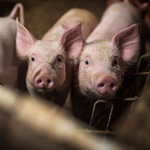
University of Missouri Scientists Breed PRRS Resistant Pigs using CRISPR
March 2, 2016| |
 The porcine reproductive and respiratory syndrome virus (PRRSV) affects pigs worldwide and is considered the most economically significant disease of swine. Vaccinations have mostly failed to prevent the syndrome's spread, but a new approach by biologists at the University of Missouri may mark a turning point. They developed a commercial agricultural application for the revolutionary CRISPR/Cas9 gene-editing method—to breed pigs resistant to infection.
The porcine reproductive and respiratory syndrome virus (PRRSV) affects pigs worldwide and is considered the most economically significant disease of swine. Vaccinations have mostly failed to prevent the syndrome's spread, but a new approach by biologists at the University of Missouri may mark a turning point. They developed a commercial agricultural application for the revolutionary CRISPR/Cas9 gene-editing method—to breed pigs resistant to infection.
CRISPR/Cas9 is a gene-manipulation tool that allows scientists to make changes in DNA with razor-sharp accuracy. For porcine reproductive and respiratory syndrome, Missouri's Randall Prather, Kristen Whitworth and Kevin Wells used the technique to breed three piglets that lacked a protein in cells that acts as a doorway for the virus.
The edited piglets were grouped together in a pen with seven normal piglets, and were inoculated with PRRSV. After five days, the normal pigs grew feverish and ill, but the genetically edited pigs remained in top health throughout the study despite sharing close quarters with their sick pen mates.
Blood testing also revealed that the edited animals did not produce antibodies against the virus, proving that they evaded infection entirely. This work and other recent experiments demonstrate the promise of CRISPR/Cas9 for the care of domestic animals.
For more on the study, read the article on Scientific American.
| |
Biotech Updates is a weekly newsletter of ISAAA, a not-for-profit organization. It is distributed for free to over 22,000 subscribers worldwide to inform them about the key developments in biosciences, especially in biotechnology. Your support will help us in our mission to feed the world with knowledge. You can help by donating as little as $10.
-
See more articles:
-
News from Around the World
- International Team Decodes Mesoamerican Bean Genome
- Researchers Find Molecular Marker for Calcium in Potatoes
- New Study Reveals Eliminating GMOs would Take Toll on Environment, Economies
- Study Shows Plants Forget Unused Memories
- Filipino Farmer Leaders Learn from Bt Brinjal Farmers in Bangladesh
- Genome Sequence of Cultivated Groundnut Completed
- Wageningen UR Develops Method for Selecting Plants with Better Photosynthesis
-
Research Highlights
- Overexpression of PslTIR1 in Tomato alters Fruit Shelf-life Characteristics
- Mutated Garlic Gene Expressed in Rice Confers Resistance to Sheath Blight
- Expression of Tomato Prosystemin in Tobacco Enhances Plant Resistance to Botrytis cinerea
-
Beyond Crop Biotech
- Bacteria Take "Mug Shots" of Threatening Viruses
- University of Missouri Scientists Breed PRRS Resistant Pigs using CRISPR
-
From the BICs
- UBIC Holds Meeting for Biotech Communication Stakeholders
-
Announcements
- 5th International Conference and Exhibition on Metabolomics
- 3rd Plant Genomics Congress: Asia
-
Read the latest: - Biotech Updates (December 3, 2025)
- Gene Editing Supplement (November 26, 2025)
- Gene Drive Supplement (February 22, 2023)
-
Subscribe to BU: - Share
- Tweet
